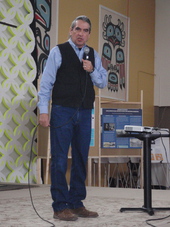Highlight
4 IGERT Workshop
Achievement/Results
Hot Topics for Cool Research:
Four IGERTs convene in Juneau to discuss Rapid Environmental and Social Change in the Arctic “The Universe has problems. Universities have departments.” Dr. Dan Wildcat from Haskell Indian Nations University, who coined the phrase “indigenuity,” addressed IGERT trainees, undergraduates, and faculty at an NSF-sponsored workshop in Juneau, Alaska. The three-day workshop brought together four IGERT programs to discuss the intersection between Traditional Ecological Knowledge (TEK) and interdisciplinary polar research. Workshop attendees came from Dartmouth College, the University of Alaska Fairbanks, the University of Kansas, and Haskell Indian Nations University, all of which have IGERT programs focused on interdisciplinary research of climate change in high latitude systems.The goals were to share Native and non-Native perspectives of rapid environmental and social changes in the Arctic, develop a better understanding of the intersection between TEK and western science, and lay the foundation for future interdisciplinary collaborations among early career IGERT trainees in these four IGERTs.
The workshop included keynote addresses from Dr. Daniel Wildcat from Haskell Indian Nations University and Dr. George Charles from University of Alaska Anchorage, an opening address by Barbara Blake, as well as a panel of local Alaskan leaders including Jimmy Stotts (Alaska Inuit Circumpolar Council President), Edward Thomas (President of the Tlingit-Haida Central Council), Vernor Wilson II (World Wildlife Fund), and Alannah Hurley (Nunamta Aulukestai). Graduate and undergraduate students tackled themes of TEK and interdisciplinary research, frontiers of Arctic research, partnering with rural communities in the North, and managing an open Arctic, through breakout groups, discussions, panels, and skits. The activities provided a framework for conversations surrounding the tough issue of incorporating traditional knowledge systems and western science. A field trip to the Mendenhall Glacier provided opportunity to see environmental change in action.
Collaborations among these IGERT programs started long before the workshop, facilitated by the workshop website, https://sites.google.com/a/alaska.edu/4_igert_w..., and will continue. Planned products from the workshop include a press release to regional and Indigenous newspapers, a public response and action plan for the National Ocean Policy, a letter of support for the UN Declaration on the rights of Indigenous people to address integration of western science and traditional knowledges, and organization of an interdisciplinary polar research and TEK session at the next SACNAS conference.
Authors: Kaitlin Keegan, Kimberly Maher, Laci Gerhart, Catherine Chambers, Lauren Culler and Julia Bradley-Cook.
Address Goals
The workshop stimulated learning and discovery on the interface between Traditional Ecological Knowledge and polar science.







